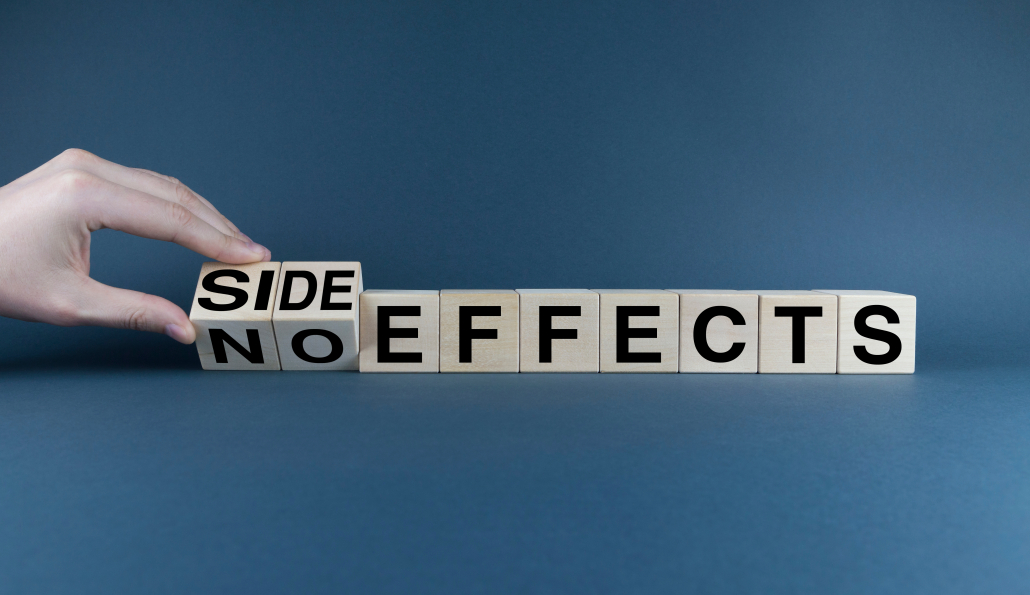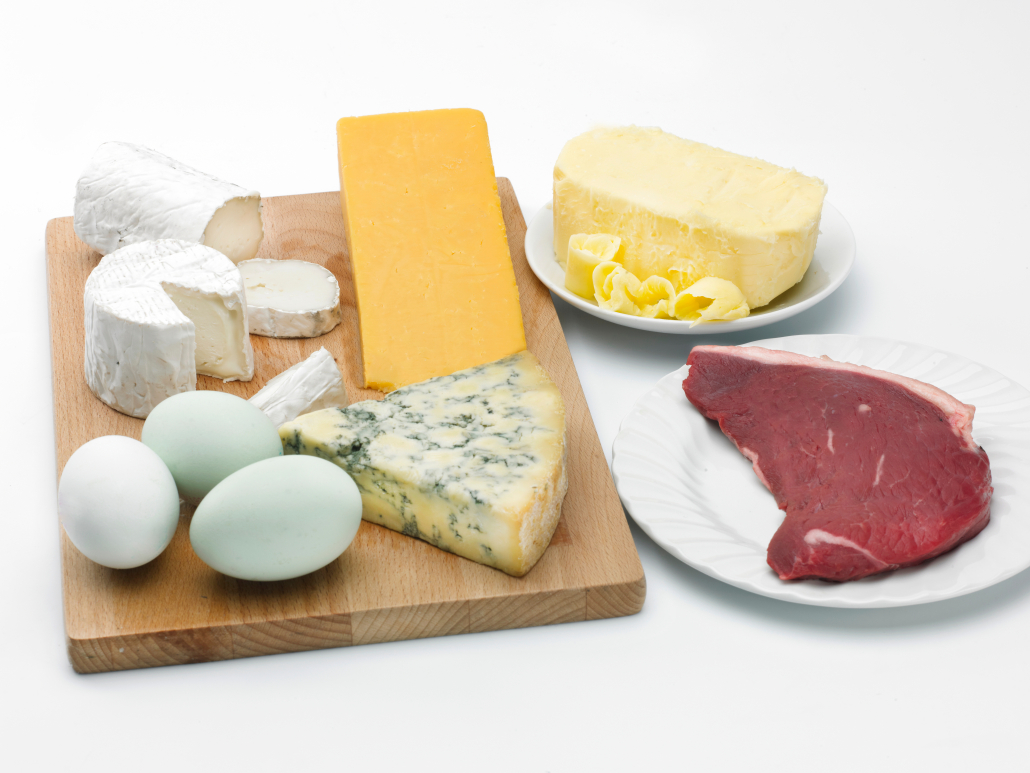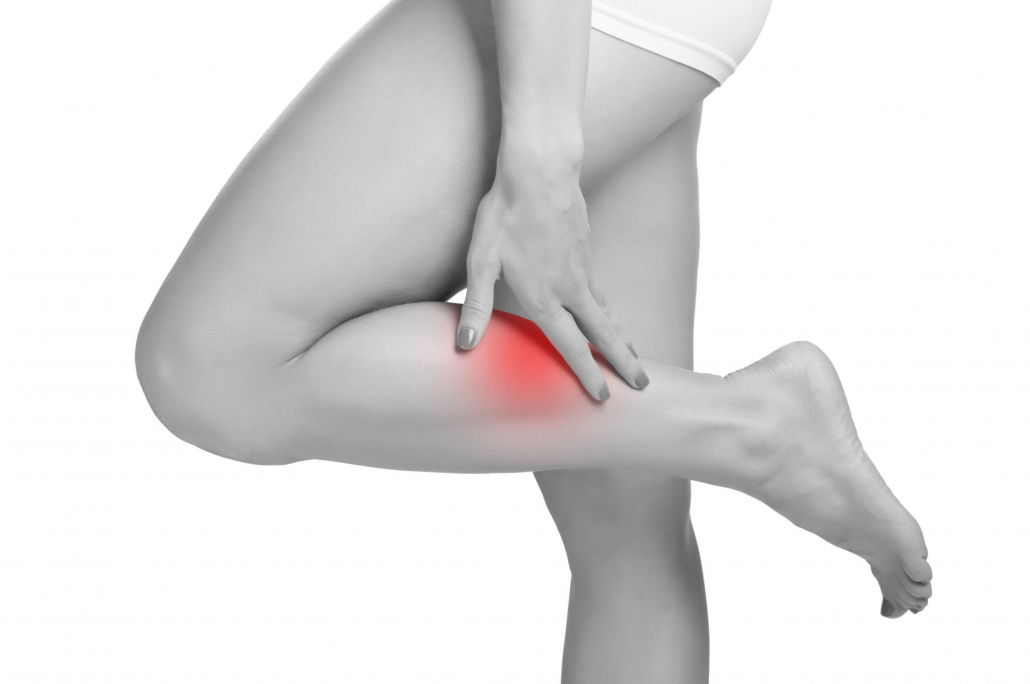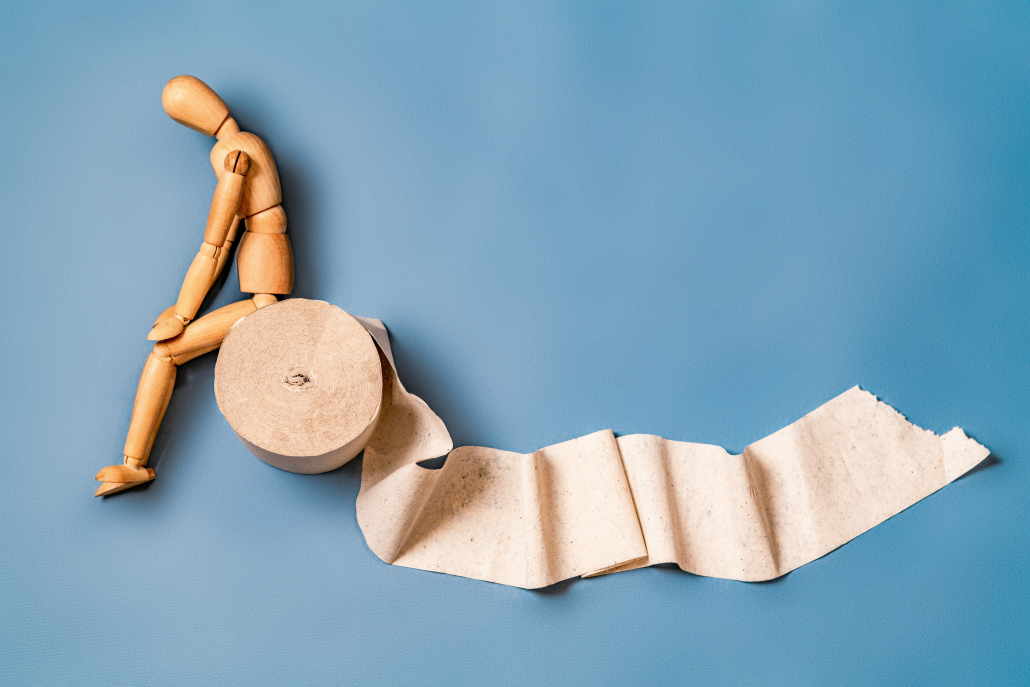We include products in articles we think are useful for our readers. If you buy products or services through links on our website, we may earn a small commission.
Keto Constipation: Why it Happens and How to Fix it
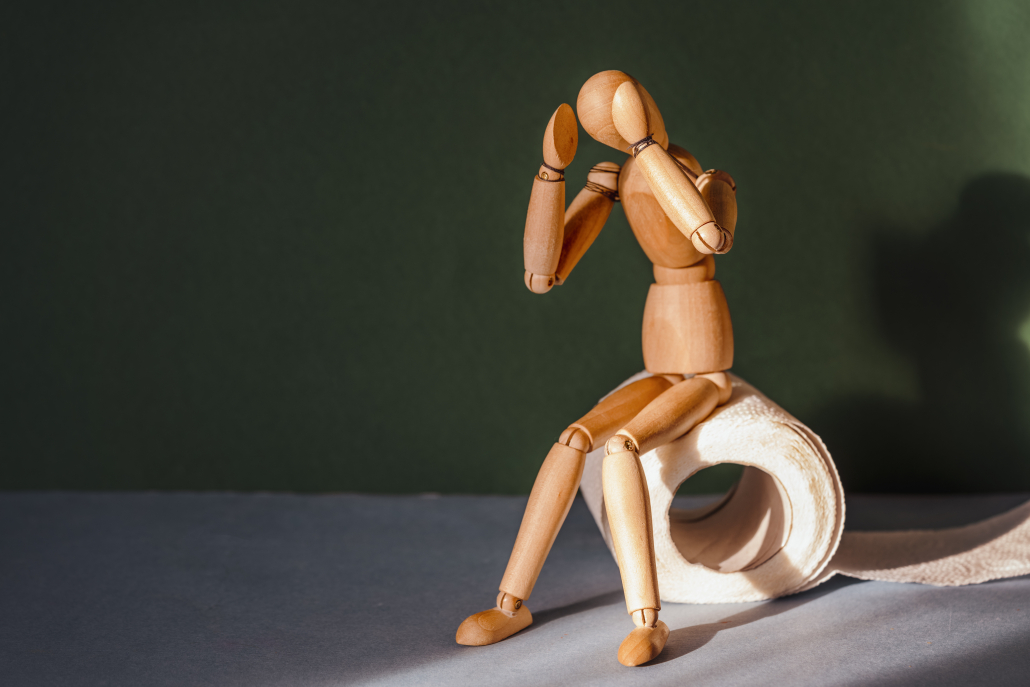
Switching from a carb-based Standard American diet to a fat-based keto diet produces a major change in digestion. Keto constipation is a common side effect of this transition. In this article, we’ll bust some of the myths around keto constipation and offer some science-backed strategies for keto constipation relief.
The Myth of Lacking Fiber
Cutting high-carb foods like grains, vegetables, and fruit, reduces your fiber intake–and many people erroneously blame keto diet constipation on this “lack” of fiber.
However, contrary to what you might’ve heard, a lack of fiber does not, by default, cause constipation.
In fact, excess dietary fiber may actually be a primary cause of constipation.
A 2012 study released in the World Journal of Gastroenterology attests that “stopping/reducing dietary fiber intake reduces constipation and its associated symptoms.” [1]
According to the study’s authors, fiber’s importance is rooted more in dogma than in clinical evidence. “The previous strongly-held belief that the application of dietary fiber to help constipation is but a myth,” the authors affirmed.
This same study found that stopping dietary fiber intake had a “very strong correlation” with reduced constipation, not more of it.
Are you Constipated or Just Pooping Less?
Many people confuse keto diet constipation with simply pooping less.
That’s because a well-formulated keto diet is based on fatty keto meats, fatty fish, and healthy fats that provide your body with all the nutrients it needs in highly bioavailable formats. This means much less unusable waste that your body needs to expel.
On the other hand, non keto foods like corn, beans, and many other fiber-laden plant foods, are often visible on the other end, which says a lot about how useful (useless) they are for you body.
Excess dietary fiber can cause so much mechanical stress that it ferments and heats up our intestines. This excess heat can then go on to damage-heat sensitive organs, notably reproductive organs. Fiber’s fermentation process also produces noxious gasses and other chemical byproducts. [2]
“A strong case cannot be made for a protective effect of dietary fiber against colorectal polyp or cancer. Neither has fiber been found to be useful in chronic constipation and irritable bowel syndrome,” the 2012 study mentioned earlier goes on to explain. “We often choose to believe a lie, as a lie repeated often enough by enough people becomes accepted as the truth. We urge clinicians to keep an open mind.”
So now that we’ve put the fiber myth to bed, let’s take a truly critical look at keto diet constipation relief.
How often Should you Poop on the Keto Diet?
Most people poop less when they’re on keto diet because the body has less fibrous waste to expel. So, how often should you be pooping on keto?
Once per day or more is a nice frequency to shoot for. Your bowel movements should be just as easy — if not easier — than they were on your previous diet. If your body’s circadian rhythm is healthy, expect these BMs to come at a predictable time each morning.
However, there is a transitional period on keto when constipation is a common issue. Let’s take a closer look at the reasons behind this.
Most Common Causes of Keto Constipation
Keto diet constipation is likely caused by one or more of the following factors:
- Your gut bacteria are taking time to adapt to a fattier, lower-fiber diet
- Your stomach acidity hasn’t yet acclimated to higher fat intake
- Your bile production is lagging behind increased bile demand
- Your body is having a hard time processing the extra protein
- You’ve unwittingly begun eating an inflammatory food
- You’re chronically dehydrated
Gut Bacteria and Constipation
When cutting carbs on keto, carb-loving bacteria will likely die off, and when they do, they’ll need to be replaced with fat-loving bacteria before normal digestive function can resume. [3]
The reset in gut bacteria has been shown to be a good thing, resulting in reduced inflammation, and reductions in symptoms of multiple sclerosis and epilepsy. 4 5 6
Yet during the transition, constipation can occur. To enhance the repopulation of healthy gut bacteria, add in keto yogurt, and cultured cottage cheese.
Stomach Acidity and Constipation
Protein provides vital structure to our body, yet it can also be difficult for the body to break down. Every gram of protein is composed of long, web-like chains of amino acids. It’s up to your body’s stomach acid to break down protein into smaller components. [4]
This process is innate to all humans, yet it might be out of practice for those who’ve been on a low-quality diet full of low-quality proteins. It can take some time for your body to respond to a diet centered on protein-rich meats
Stick with it, though — a growing body of evidence points to the fact that ever since our caveman ancestors, our bodies were made to eat meat. [5]
Bile Function and Constipation
Bile acid is another vital digestive fluid. While stomach acid breaks down proteins, bile acid breaks down fats.
The keto diet, of course, contains lots of healthy fats. Bile is made in your liver and released by your gallbladder; the complexity of its ‘supply chain’ means it can take a while for supply to catch up to the increased demand. [6]
Too Much Protein Can Cause Constipation
Eating too much protein is one of the most common causes of keto diet constipation.
If you’re you’ve gone from eating meat a few times a week to a carnivore or lion diet where you’re eating over a pound of meat every day, don’t be surprised if your digestion takes a few weeks to catch up with the change.
Thankfully there’s a simple solution to this problem. Eat more fat. Remember, the keto diet calls for 70-80% of all calories as fat.
Select fatty cuts of meat. Opting for cuts with a high fat:protein ratio may help you avoid the metabolic inefficiency that comes with converting protein to carbs. [7]
Dehydration
When your body first transitions into ketosis your body sheds water that had been stored alongside glycogen within your muscles and liver. [8]
While dumping unneeded glycogen is a good thing, the whole process can have a laxative effect and result in low electrolytes. [9]
In other words, your transition into keto can make you become dehydrated if you’re not careful.
Be sure to drink ample water during this period, while increasing your salt intake, and supplementing with electrolytes.
Missing Nutrients
Keto can also be harder to adapt to if your body has any underlying nutrient deficiencies. If you’re running low on vitamin A or vitamin D, you may have a problem upregulating bile acid production.
Over 90% of Americans are deficient in vitamin D. Roughly 80% of patients hospitalized with COVID are vitamin D deficient, too. [10]
| Nutrient | % of population below their RDV |
| Potassium | 100% |
| Vitamin D | 94.3% |
| Choline | 91.7% |
| Vitamin E | 88.5% |
| Vitamin K | 66.9% |
| Magnesium | 52.2% |
| Calcium | 44.1% |
| Vitamin A | 43% |
| Vitamin C | 38.9% |
| Manganese | No data |
How to Avoid Keto Constipation
Now that we know what causes keto constipation let’s look at what you can do to fix it.
- Stay hydrated
- Avoid inflammation and allergens
- Keep your electrolytes up
- Try ox bile or HCL
- Up your exercise
- Supplement with organ meat
1. Stay Hydrated
As we explained above, the transition into keto can cause rapid water loss as your body burns up its glycogen reserves and dumps off the accompanying water. Even your colon can become dehydrated. When this happens, stool in the colon can become compact and difficult to pass. [11]
Drink lots of water and salt your food liberally, as sodium is known to help your body retain the hydration status it already has. Dr. Kiltz and other health experts advise for up to 2.5 liters of water per day. [12]
Your urine color provides an easy way to observe hydration status at home; it should be light-colored, not dark or bright.
2-2.5 liters of water per day may be significantly more than you’re accustomed to. Just keep in mind that you’re free to supplement your ‘plain’ water consumption with water-based beverages like coffee, tea, or bone broth.
Contrary to prior dogma, coffee is net-hydrating and counts towards your daily water intake. [13]
Caffeinated beverages may help tackle constipation via other pathways, too — most of them are mild natural laxatives. [14]
2. Avoid Inflammatory and Allergenic Foods
Generally speaking, the keto diet is anti-inflammatory. A keto food list cuts out most processed junk food and industrial vegetable oils while reducing plant foods high in toxins and antinutrients.
But even certain keto-friendly foods can be inflammatory for some. Dairy allergens are fairly common and can flare up when people eat large amounts of keto cheeses.
Nuts on keto are another popular food that can cause constipation. Though high in fat and protein, they’re also high in inflammatory omega-6 fatty acids along with lots of fiber.
Eggs are another nutritious food that has the potential to be allergenic.
You might be able to circumvent these potential issues by switching to raw and A2 dairy. But when in doubt, cut them out. [15]
3. Keep your electrolytes up
Electrolytes are compounds that make water even more hydrating. Electrolytes also keep your muscles (including bowel muscles) firing on all cylinders. The primary electrolytes are sodium, potassium, and magnesium.
Magnesium
Magnesium has an innate laxative effect. Unfortunately, soil depletion means most foods don’t contain as much magnesium as they used to. That means most people are at least slightly magnesium deficient. [16]
Up your intake by getting a magnesium citrate or magnesium glycinate supplement.
Swapping out your regular water for authentic mineral water is another viable means of getting extra magnesium into your body. [17]
Sodium
The initial stages of ketosis see your kidneys excrete far more sodium than normal. Over time this effect tapers down — but in the meantime, getting in plenty of extra salt is essential.
Dr. Kiltz recommends getting roughly 12 grams of salt (the equivalent of two teaspoons) per day during your transition into full ketosis.
You can reduce your salt intake to roughly 5 grams per day once you’re out of keto-flu territory.
4. Try ox bile or HCL
Ox bile and betaine HCL are natural acids that can help your body digest dietary fats until its own bile production has had enough time to catch up.
These supplements may also increase bile production directly. With more bile comes better absorption of vital nutrients — and reduced risk of constipation. [19]
You might also try eating plenty of liver, as the choline found in this organ meat superfood might help your body digest fat. [20] If you’re resistant to the taste of fresh liver, desiccated liver supplements are a convenient alternative.
5. Increase Physical Activity
Digestion and nutrient assimilation requires a balance of chemical and physical processes.
We’ve addressed the chemical factors that can either make or break your digestion above, so let’s look at the physical side of things.
Getting plenty of movement is a surprisingly effective way to keep yourself regular and constipation-free. Just five minutes of post-meal walking or yoga can help contract the muscles and tendons that cross over your digestive tract, speeding up transit time in the process.
Have you ever noticed that road trips and constipation go hand in hand? That’s no coincidence. Thankfully the opposite is also true, making movement a truly holistic antidote to constipation.
To get started, try this yoga for digestion sequence
6. Supplement with Organ Meats
Organ meats are a true superfood. They contain many of the vitamins and cofactors your body needs to get acclimated to the metabolic shifts of ketosis.
If you’re not into taking the DIY approach to organ meats, Dr. Kiltz’s grass-fed organ meat supplements provide high-powered nutrition sourced from grass-fed New Zealand beef.
Keto Constipation Relief: The Takeaway
Constipation is a common setback that many new keto-dieters run into. Thankfully, it’s easy to avoid or overcome.
Staying hydrated, consuming moderate amounts of caffeinated beverages, increasing salt, while supplementing with electrolytes and bile are all winning strategies for fixing constipation on keto.















